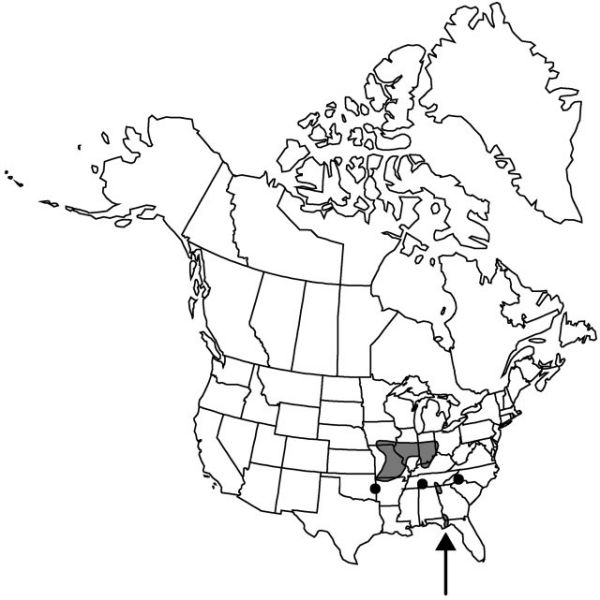Difference between revisions of "Melanthium woodii"
Novon 8: 332. 1998.
FNA>Volume Importer |
imported>Volume Importer |
||
| (6 intermediate revisions by 2 users not shown) | |||
| Line 8: | Line 8: | ||
}} | }} | ||
|common_names=Ozark bunch-flower;Wood’s bunch-flower | |common_names=Ozark bunch-flower;Wood’s bunch-flower | ||
| − | |basionyms={{Treatment/ID/ | + | |special_status={{Treatment/ID/Special_status |
| + | |code=E | ||
| + | |label=Endemic | ||
| + | }} | ||
| + | |basionyms={{Treatment/ID/Basionym | ||
|name=Veratrum woodii | |name=Veratrum woodii | ||
|authority=Robbins ex Alph. Wood | |authority=Robbins ex Alph. Wood | ||
| + | |rank=species | ||
| + | |publication_title=Class-book Bot. ed. | ||
| + | |publication_place=2, 557. 1847 | ||
}} | }} | ||
|synonyms={{Treatment/ID/Synonym | |synonyms={{Treatment/ID/Synonym | ||
|name=Veratrum intermedium | |name=Veratrum intermedium | ||
|authority=Chapman | |authority=Chapman | ||
| + | |rank=species | ||
}} | }} | ||
|hierarchy=Liliaceae;Melanthium;Melanthium woodii | |hierarchy=Liliaceae;Melanthium;Melanthium woodii | ||
| Line 30: | Line 38: | ||
|elevation=10–800 m | |elevation=10–800 m | ||
|distribution=Ark.;Fla.;Ga.;Ill.;Ind.;Iowa;Ky.;Mo.;N.C.;Ohio;Okla.;Tenn. | |distribution=Ark.;Fla.;Ga.;Ill.;Ind.;Iowa;Ky.;Mo.;N.C.;Ohio;Okla.;Tenn. | ||
| − | |discussion=<p>The purplish maroon to chocolate-brown tepals and the tomentose young ovaries are distinguishing characteristics of Melanthium woodii. In parts of Illinois and the Ozark regions of Missouri and Arkansas, this species sometimes is locally common, but often in the leafy sterile condition. Flowering is sporadic and appears to be promoted by fire (J. E. Ebinger 1993).</p> | + | |discussion=<p>The purplish maroon to chocolate-brown tepals and the tomentose young ovaries are distinguishing characteristics of <i>Melanthium woodii</i>. In parts of Illinois and the Ozark regions of Missouri and Arkansas, this species sometimes is locally common, but often in the leafy sterile condition. Flowering is sporadic and appears to be promoted by fire (J. E. Ebinger 1993).</p> |
|tables= | |tables= | ||
|references= | |references= | ||
| Line 39: | Line 47: | ||
-->{{#Taxon: | -->{{#Taxon: | ||
name=Melanthium woodii | name=Melanthium woodii | ||
| − | |||
|authority=(Robbins ex Alph. Wood) Bodkin | |authority=(Robbins ex Alph. Wood) Bodkin | ||
|rank=species | |rank=species | ||
| Line 53: | Line 60: | ||
|publication title=Novon | |publication title=Novon | ||
|publication year=1998 | |publication year=1998 | ||
| − | |special status= | + | |special status=Endemic |
| − | |source xml=https:// | + | |source xml=https://bitbucket.org/aafc-mbb/fna-data-curation/src/2e0870ddd59836b60bcf96646a41e87ea5a5943a/coarse_grained_fna_xml/V26/V26_68.xml |
|genus=Melanthium | |genus=Melanthium | ||
|species=Melanthium woodii | |species=Melanthium woodii | ||
Latest revision as of 21:16, 5 November 2020
Rhizomes 1.5–2 × 0.5–1 cm; bulbs 1–1.6 cm. Stems 1/2–2/3 floriferous, 0.7–1.5(–2) m. Leaf blades elliptic to oblanceolate, 20–50 × 3–10 cm, apex acute. Inflorescences 3–6 dm; terminal raceme 1–4 dm; secondary racemes spreading to ascending, 0.6–1.2(–2.2) dm; tertiary racemes rare; bracts lanceolate to subulate, brownish green, 2–6(–9) mm, floccose abaxially, proximally, and marginally. Tepals purplish maroon to chocolate brown adaxially, green abaxially, aging to dark green, obovate-oblanceolate, 5–10 × 1.8–4 mm, base gradually attenuate, not clawed, margins entire, apex obtuse; glands dark purple to nearly black, obcuneate, not nectariferous; stamens 4.5–6.5 mm; filaments adnate to tepal bases, 0.3 mm from ovary base, dilated basally, 1/2 or more as wide as tepals at insertion point; anthers 0.7 mm; ovary conic-ovoid, finely tomentose, becoming glabrate; styles 1.6–4 mm; pedicel spreading to ascending, 2–11 mm. Capsules elliptic-oblong, 18–25 × 10–15 mm, sparsely pubescent. Seeds 8–13 × 4–6 mm (including wings). 2n = 16.
Phenology: Flowering summer.
Habitat: Rich, moist, deciduous forests
Elevation: 10–800 m
Distribution

Ark., Fla., Ga., Ill., Ind., Iowa, Ky., Mo., N.C., Ohio, Okla., Tenn.
Discussion
The purplish maroon to chocolate-brown tepals and the tomentose young ovaries are distinguishing characteristics of Melanthium woodii. In parts of Illinois and the Ozark regions of Missouri and Arkansas, this species sometimes is locally common, but often in the leafy sterile condition. Flowering is sporadic and appears to be promoted by fire (J. E. Ebinger 1993).
Selected References
None.